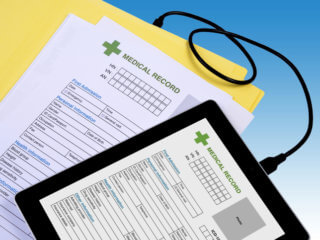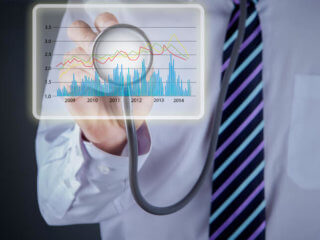Is the medical profession ready for a technology-driven evolution?
 The landscape of healthcare is becoming transformed rapidly into a digital platform that is highly dependent on digital health technologies. These changes at the core of the healthcare infrastructure have demanded professionals to acquire essential skills to gather, handle, manage, and interpret large amounts of electronic data and operate highly advanced technological devices. Not only healthcare professionals but also patients, their families, and stakeholders are required to adopt and embrace these technologies while keeping pace with the rapid advances. Therefore, it is a valid question whether our healthcare system is ready for such a technological evolution.
The landscape of healthcare is becoming transformed rapidly into a digital platform that is highly dependent on digital health technologies. These changes at the core of the healthcare infrastructure have demanded professionals to acquire essential skills to gather, handle, manage, and interpret large amounts of electronic data and operate highly advanced technological devices. Not only healthcare professionals but also patients, their families, and stakeholders are required to adopt and embrace these technologies while keeping pace with the rapid advances. Therefore, it is a valid question whether our healthcare system is ready for such a technological evolution.
Are healthcare facilities or institutions ready to adopt digital prevention technologies?
Data gathered from the Office of the National Coordinator for Health IT suggests that as of 2015 94-98% of all the American hospitals have adopted certified EHR technology. The lowest rates were observed in small rural and urban hospitals (94%). During 2008-2015 period, the adoption of either basic or certified EHR increased significantly, even though the adoption rates for rural and urban hospitals as well as Critical Access hospitals remained at lower capacities.
To have a certified EHR system, a health institute must comply with the ‘technological capability, functionality, and security’ requirements and regulations established by the Department of Health and Human Services. Therefore, limitations in funding or personnel to develop and maintain such technological standards may hinder the adoption of healthIT technologies by some of the healthcare facilities.
Even though the majority of the hospitals adopted healthIT systems, due to interoperability barriers and challenges, the integration of HealthIT into day-to-day clinical practice remains low.
Reports suggest that the interoperability problems and obstacles are not limited to technical difficulties but also may have economic, policy, social, and cultural roots. To adopt digital health technologies is a difficult task and so as the maintenance and evolution. Such changes at institutional level require not only additional trained professionals, devices and tools, and more importantly financial capabilities, which has limited the extent to which hospitals can adopt technological advances.
Therefore, at the institutional level, more information, training and incentives regarding information governance, interoperability, precedence on accountability, sufficient resources and financial support may indeed remove some of uncertainties and insecurities the management has and allow embracing the technology.
| Recommended for you | |
| Role of policy in guiding digital health revolution | |
| Top digital health events in India | |
| 300 CEOs of innovative digital health startups in India |
How ready are the healthcare professionals in embracing digital health?
Many physicians are willing to employ healthIT in their clinical practice and thus spend time online attempting to educate themselves and acquire necessary skills. Therefore, proper healthIT literacy and skills training may increase the adoption rates. Recently launched initiative for Accelerating Change in Medical Education through the incorporation of digital technology was an essential step in persuading doctors to embrace HealthIT. Moreover, the digital health technology and patient-based data gathering warrant a promise towards personalized precision medicine which is also evidence-based.
Technology is being used to enhance patient-healthcare provider engagement for which both parties should be customized to the technology being used.
However, data gathered from the Office of the National Coordinator for Health IT suggest that from 2013 to 2015, there has been a significant increase in the number of doctors who use digital health tools to communicate with patients, send prescriptions and share health information.
Regardless, physicians who use technology to include patient-gathered data in their system has been little (32-37%), possibly due to being new to the concept of patient gathered data and personalized medicine approaches and/or hesitancy to incorporate significant amounts of patient-generated data (big data) that may or may not be used ‘meaningfully’. Analysis and interpretation of big data might still be a quite challenging task for doctors as they have not been trained to deal with such data and some institutions still do not believe in the necessity to incorporate big data analytic aspects into medical education.
While this can be solved to some extent by an active collaboration with the IT professionals, it is becoming inevitable that doctors must have good healthIT knowledge and skills to survive in the technology-driven evolution of health care.
How willing are patients to embrace healthIT?
Many patients have already experienced the advantages of electronic health data transfer which has reduced cost, waiting times, errors and has allowed remote treatment services. However, when it comes to technology, some people are hesitant to use technology, and some patients would like to use the technology but economically or educationally not equipped to handle it. This has created a digital health discrimination.
Moreover, most patients are concerned about privacy and safety of their health data. Therefore, the acceptance of digital technologies in the healthcare setting has become an uphill battle for patients as well.
Collectively, it seems that healthcare institutions, doctors, other healthcare providers and patients show a willingness to embrace digital health-driven revolution in the healthcare setting. During the last decade, they have accepted and routinized these technologies however at their own pace. Any initiatives to improve proper training, financial support and emphasis on security and safety will allow much smoother transformation into the digital era.
Image credit: www.istockphoto.com

















